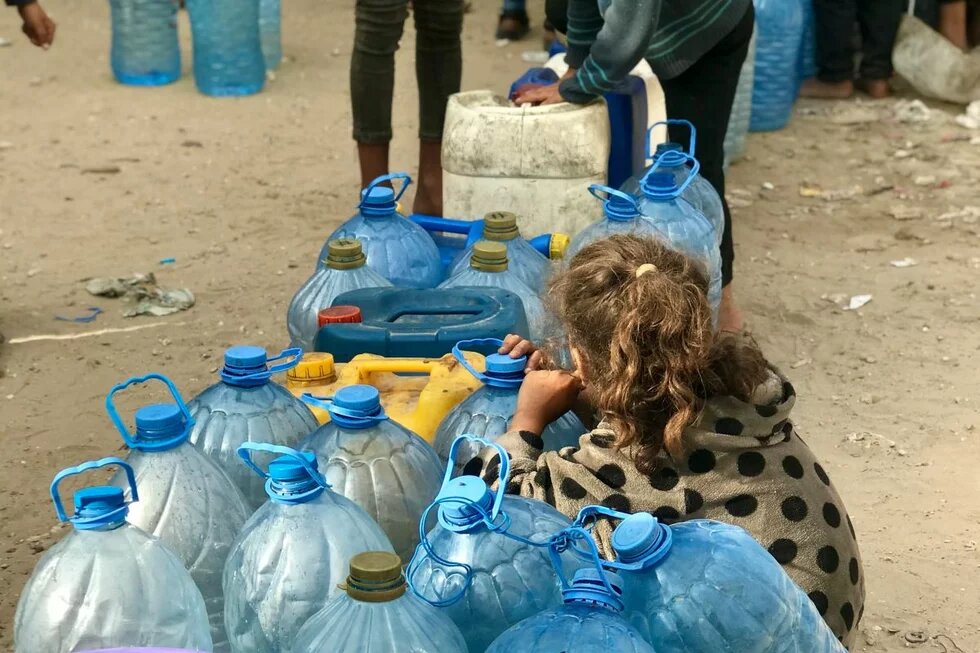In order to ensure the security and well-being of all citizens in Israel and Palestine, and to achieve lasting peace in the region, regional and global actors should move away from a purely state centric and militarized understanding of security towards a more human-centric approach, which treats individuals and communities as equal stakeholders.

‘Security’ in the context of the Israeli-Palestinian conflict has been one of the most vague and politically exploited concepts. What became tragically clear through the horrific Hamas attacks on Israeli civilians on October 7, which left around 1,200 Israelis dead and more than 250 kidnapped, and the subsequent and ongoing bombardment of the Gaza Strip that has claimed more than 35,000 Palestinian lives to date, is that
the status quo did not guarantee security to either side of the conflict.
This is true for the Palestinians in Gaza, suffering from a 16-year blockade and regular attacks by Israel, for the Palestinians in East Jerusalem and the West Bank, living under occupation, and for Israeli citizens (including 20 percent Palestinian Israelis), who are constantly threatened by attacks or rocket fire from Gaza. Moreover, the trauma of the October 7 attack, as well as the Iranian attack on April 13, has deeply shaken Israelis’ sense of security.
The Israeli government immediately started its military campaign in Gaza in order to “restore security”. Yet, both Israel and its closest allies, including the US and Germany, largely ignored the key question of what lasting security for civilians in Israel and Palestine would ultimately mean, and under which circumstances it could be realised. A few days after the attack, the German Chancellor, Olaf Scholz, declared that, “Security in and for Israel must be restored, and that is why Israel must be able to defend itself.” He did not elaborate on the term ‘security’. However, as reflected in the skyrocketing arms exports to Israel in the following months, he was referring to Israel’s military capabilities.
After more than half a year into the Israeli offensive in Gaza, it has become clear that the declared goals of the war have not been realized: “eliminating” Hamas, freeing the hostages and “restoring security”. In fact, the results of the offensive have been nothing but devastating: in addition to the loss of life, 80,000 Palestinians have been wounded, hundreds of thousands are threatened by hunger, almost the entire population displaced and the vast majority of civilian buildings in the Gaza Strip destroyed. Meanwhile settler violence and attacks against Palestinians have escalated rapidly in the West Bank. Finally, Israeli civilians have witnessed an increase of armed attacks across the country and have faced ongoing displacement due to the conflict with Hezbollah on the Northern border with Lebanon. On top of these developments, the risk for a broader regional escalation is increasing.
After Israel’s bombing of Iran’s consulate in Damascus in early April and Iran’s first direct attack on Israel on April 13, the region seemed on the brink of a major war. The urgent necessity to deescalate, to reach a permanent ceasefire – as demanded by the Security Council Resolution 2728 from March – and to return to a political debate about lasting solutions and conflict resolution seemed obvious. Yet, no path or promising strategy towards these goals seems to be in sight.
Diverging views: The prevailing security paradigm in Israel, the region and the reaction of the international community
When Olaf Scholz underlined Germany’s commitment to Israel’s security and reiterated the position that “Israel’s security is part of Germany’s raison d’état,” he failed to describe what “Israel’s security” means and how it can be effectively enhanced. This left the interpretation almost exclusively to the current Israeli government and its Prime Minister, Benjamin Netanyahu. While he is facing mounting criticism, domestically and internationally, and most Israelis hold him personally responsible for the disastrous security failure of October 7, ‘Mr. Security’ – as he has been called by his supporters for years – has mainly followed the traditional Israeli security doctrine in his reaction, relying heavily on deterrence and demonstrating military strength.
This overall approach goes back to 1948, the foundation of the Israeli state and the first Arab-Israeli war. In that context, and for as long as most regional states, as well as the Palestinian Liberation Organisation (PLO), proclaimed the goal to reverse the political order and the reality of a Jewish State in the Middle East, security was defined primarily by the aim to build up powerful military capabilities. .
However, with the 1967 Israeli occupation of Gaza, the West Bank, East-Jerusalem and the Golan Heights, a grave dilemma emerged. While most Israeli leaders saw the newly occupied territories as a huge improvement of Israel’s defensive capabilities against Arab armies, the Israeli army was now responsible for controlling the Palestinian population and soon for protecting the quickly growing and ideologically motivated settlement movement. Some Israeli politicians and intellectuals urged an end to occupation and building settlements soon after it started in 1967, as they feared the negative long-term consequences and increased Palestinian-Israeli antagonism. This soon materialized in the form of armed attacks by the PLO and other militant groups, the mostly non-armed resistance of the first Intifada and the founding of the ‘Islamic Resistance Movement’ Hamas and their own violent campaigns, including suicide bombings.
The Oslo process of the early 1990s briefly seemed to inject some hope for a landmark change, when the then Prime Minister Yitzchak Rabin and Foreign Minister Shimon Peres envisioned a “new Middle East” with a two-state-solution and the PLO recognized the state of Israel. However, the short-lived ‘peace process’ has vanished ever since. With the boundless violence of the Second Intifada, the Israeli government returned to a security strategy based on force and unilateral action, relying on a system of increased checkpoints, closures, nightly raids, as well as increased restrictions on political activity and freedoms of movement, expression and assembly - thus vastly increasing the permanent insecurity of the Palestinian population.
In 2002, the Israeli government, led by Ariel Sharon, started the construction of what it called a “security barrier” (Gader ha-bitachon) in response to attacks by Palestinian militants during the Second Intifada. As the wall was mostly constructed on Palestinian land, the International Court of Justice (ICJ) in an advisory opinion in 2004 determined that the construction violated Palestinian rights and that it “cannot be justified by military exigencies or by the requirements of national security or public order.” When Sharon ordered the evacuation of the settlers and the army from Gaza in 2005, the goal was not a step towards Palestinian self-rule, but the permanent division of Palestinian land.
The Palestinian Authority, which has largely failed on its founding mission of bringing about a state building project in Palestine, has lost most of its credibility and legitimacy. While it has been coordinating security with Israel ever since the Oslo process started, despite the ongoing Israeli occupation, it has proved largely unable to guarantee the security of its own citizens. Even worse, the PA has suppressed and silenced dissent, as seen in 2020, when one of the PA’s most outspoken critics, Nizar Banat, died in Palestinian custody, allegedly under torture.
While the international community has always officially upheld a two-state-solution, it has done little to keep the option alive. Meanwhile, in the past years, the regional security architecture has been mainly driven by the Iranian-Saudi divide, which has led to a new arms race and increased worries about Iran’s nuclear program. Ironically, this fault line, which has fueled conflicts throughout the region, has reduced threats to Israel, as many Arab states and former enemies have now become allies against Iran as the common enemy.
Donald Trump’s Abraham Accords tried to capitalize on this development, but it ignored the ongoing Israeli-Palestinian conflict. Moreover, the so-called ‘deal of the century’ was widely dismissed since it disregarded international consensus and factually dismantled the existing Arab Peace Initiative, which had envisioned full Arab-Israeli normalization after the realization of a two-state-solution.
The security doctrine endorsed by the Israeli right is based on opposition to conflict resolution, show of force and unilateralism in combination with the ideological goal of permanent Jewish-Israeli control of the West Bank and East-Jerusalem. This approach has failed and is a recipe for permanent insecurity – for Palestinians, who will remain under occupation and exposed to settler attacks, and for Israelis who would face continued Palestinian attempts to resist occupation with all available violent and non-violent means as well as a spike in Jewish-Arab violence within Israel..
Towards a Human Security Approach for all in Israel and Palestine
The 7 October attacks were a stark reminder that the protection and long-term security of all individuals and communities in the region must be at the center of any political initiative regarding the conflict. The catastrophic attack has proven the failure of an approach focusing on permanent control, surveillance, military presence, walls and fences – all of which can ultimately be overrun, and in this case even by a far less capable enemy.
Yet, the Israeli government has announced that it wants to take over security control in the Gaza Strip using the same methods once again. It has already erected a security buffer zone along the border extending one kilometer into the strip, expropriating 16 percent of the land. In the north of the Strip, Israel has established an East-West-corridor, dividing the area into two parts, allowing the Israeli army to intervene permanently in Gaza. Israel also wants to maintain control over the border crossings, which would further jeopardize an already extremely difficult process of reconstruction and aid provision.
Olaf Scholz’s initial reaction to the October attack, and the reaffirmation of Germany’s support for Israel, failed to address the best ways of ultimately addressing Israel’s security – and what this would mean for the security of Palestinians. The answer could lie in a shift in the security approach regarding Israel and Palestine towards a perspective that focuses on human security, on the safety and well-being of communities and individuals and on the long-term security of all people ‘between the river and the sea’ – an approach that Germany has claimed to support since more than two decades.
The concept of ‘human security’ has been debated roughly since the 1990s, when it was first comprehensively introduced in the 1994 annual UNDP human development report. It represents a perspective that does not focus on conflicts between states, but on the broader threats to the security of individuals and local communities, including non-military threats such as diseases, crime or poverty. The assumption is that when individual security is undermined, this can have an immediate impact on collective security and stability. Therefore, it is not enough to only mitigate military escalation; other factors also need to be addressed coming towards a holistic approach.
In Germany, a broadened concept of security appears in most government strategies regarding crisis prevention and conflict resolution, from the early 2000s to the most recent Federal Foreign Office Guidelines on Feminist Foreign Policy. However, the concept remains vague and has rarely been translated into concrete initiatives, and with the recent debates dominated by the ongoing Russian invasion of Ukraine, as well as the war in Gaza, discussions have focused mostly on military capabilities, deterrence and the delivery of arms.
Accordingly, the most common reaction of Israel’s allies - including Germany - in response to the October 7 massacres was the provision of arms to the Israeli government. Nevertheless, given the current rightwing Israeli government, their destructive Gaza campaign and their ideological goals in the West Bank, this support is more likely to exacerbate the ongoing conflicts, the risks of regional escalation and the plight of Gaza’s civilians than increase Israeli security.
Human security as a key concept focuses on the security of all people ‘between the river and the sea’; an approach that should be a top priority for a post-Gaza-war order.
Germany and the EU should address three main areas:
Firstly, a regional political horizon, leading to the establishment of a Palestinian state, is vital. While for decades the international community did not prioritize a solution to the Israeli-Palestinian conflict and even actively ignored it, the dangers of inaction have once again become clear, with the current war dragging the region to the brink of a broader escalation. Arab leaders have now reiterated their position to support a Palestinian state and subsequent normalization with Israel – a solution that offers the best option for security for all citizens ‘between the river and the sea’. First steps need to address the reconstruction of the Gaza Strip, the rehabilitation of its traumatized and wounded population and a reconnection of the isolated Palestinian territories under a common democratically legitimized Palestinian government. Rehabilitation of traumatized Israeli communities along the border with the Gaza strip as well as international support in order to prevent any renewed attack on Israeli civilians should be part of that regional political horizon.
Secondly, it is time to invest in people and communities. If outside actors such as the US and the European Union including Germany want to contribute to a new security paradigm, they should start to massively strengthen civil society actors and local communities, hear local perspectives and address the grassroots level across Israel and Palestine. They should promote actors who have been working tirelessly to strengthen individual and collective rights across the division lines of Israel and Palestine, based on human rights and international humanitarian law. The international community should now focus on means to protect the security, rights, dignity, equality and freedoms of all civilians. This will also be the starting point for any future settlement between Israelis and Palestinians.
Finally, respect for international law and standards should be restored. More specifically, the US and the EU should avoid double standards in addressing violations of human rights and international humanitarian law. They should wholeheartedly support attempts towards greater accountability. International legal proceedings by the International Criminal Court and the ICJ are not only key efforts to hold those responsible for grave violations accountable; they can also uphold basic principles of human security and dignity. This is demonstrated by the provisional measures put in place by the ICJ for the protection of Gaza’s civilians from “bodily and mental harm” as well as with the provision of “humanitarian assistance to address the adverse conditions of life.” It is also demonstrated by the statement of ICC Prosecutor Khan that “laws of armed conflict apply to all“ and „the lives of all human beings have equal value.“
Only a perspective that will put the security and well-being of both Palestinian and Israeli individuals and communities at its core can pave the way towards a more peaceful future ‘between the river and the sea’.


